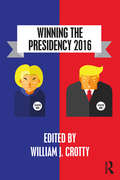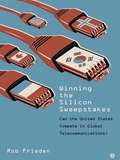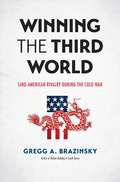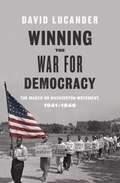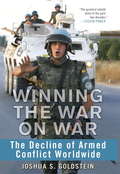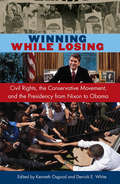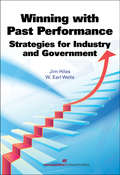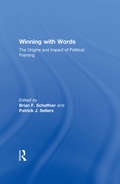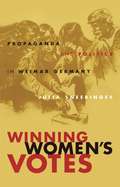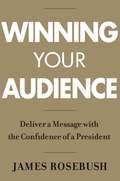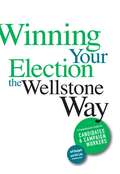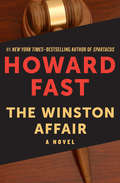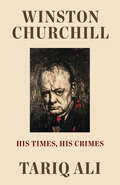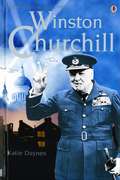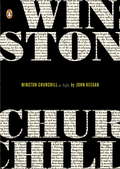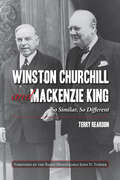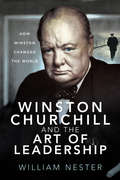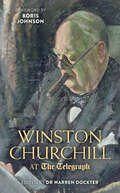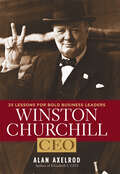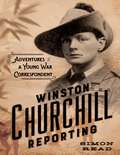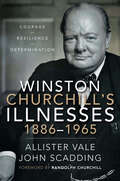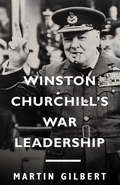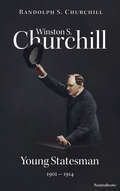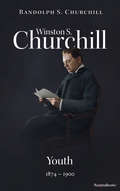- Table View
- List View
Winning the Presidency 2016
by William J. CrottyThe presidential election of 2016 was unlike any in modern American history. Donald Trump, a successful businessman, well known reality television host and a political novice with no clear policy views or political attachments, ran for the presidency. His opponent was Hillary Clinton, a candidate with a long and impressive career in politics. She was the first woman nominee of a major political party and, should she have won, the first woman president of the United States. No one gave Trump much of a chance. Yet he won the election. How did he do it? What explains his political success? What can we expect from a Trump presidency? This book answers these questions. It presents a clear and definitive overview of his campaign, it controversies and setbacks and its successes. Winning the Presidency 2016 identifies who voted for Donald Trump and why. It explains why Hillary Clinton lost. Essential reading for understanding a campaign with no precedents and a presidential election that could have seismic consequences for the conduct of American government.
Winning the Silicon Sweepstakes: Can the United States Compete in Global Telecommunications?
by Rob FriedenIn this timely book, Rob Frieden points out the many ways the United States has fallen behind other countries in telecommunications and broadband development. Despite the appearance of robust competition and entrepreneurism in U. S. markets, there is very little of either. Because of an inattentive Congress and a misguided FCC unwilling to confront real problems, industry incumbents can earn healthy profits while keeping the United States in the backwaters of Internet-based information, communication, and entertainment markets. At every turn, regulators have tipped the scales in favor of large established companies, creating an environment that stifles innovation. As a consequence, Americans are stuck with relatively slow connectivity and with equipment that lacks features that have been staples in other countries for years. In telecommunications, the United States is a little like a third world country that is developing under crushing bureaucracies without recognizing that the rest of the world has passed it by. Professor Frieden not only shows how failure can intrude on the ability of the United States to compete but suggests how to restore its competitiveness.
Winning the Third World: Sino-American Rivalry During the Cold War
by Gregg BrazinskyWinning the Third World examines afresh the intense and enduring rivalry between the United States and China during the Cold War. Gregg A. Brazinsky shows how both nations fought vigorously to establish their influence in newly independent African and Asian countries. By playing a leadership role in Asia and Africa, China hoped to regain its status in world affairs, but Americans feared that China's history as a nonwhite, anticolonial nation would make it an even more dangerous threat in the postcolonial world than the Soviet Union. Drawing on a broad array of new archival materials from China and the United States, Brazinsky demonstrates that disrupting China's efforts to elevate its stature became an important motive behind Washington's use of both hard and soft power in the "Global South." <p><p> Presenting a detailed narrative of the diplomatic, economic, and cultural competition between Beijing and Washington, Brazinsky offers an important new window for understanding the impact of the Cold War on the Third World. With China's growing involvement in Asia and Africa in the twenty-first century, this impressive new work of international history has an undeniable relevance to contemporary world affairs and policy making.
Winning the War for Democracy: The March on Washington Movement, 1941-1946
by David LucanderScholars regard the March on Washington Movement (MOWM) as a forerunner of the postwar Civil Rights movement. Led by the charismatic A. Philip Randolph, MOWM scored an early victory when it forced the Roosevelt Administration to issue a landmark executive order that prohibited defense contractors from practicing racial discrimination. Winning the War for Democracy: The March on Washington Movement, 1941-1946 recalls that triumph, but also looks beyond Randolph and the MOWM's national leadership to focus on the organization's evolution and actions at the local level. Using personal papers of MOWM members such as T.D. McNeal, internal government documents from the Roosevelt administration, and other primary sources, David Lucander highlights how local affiliates fighting for a double victory against fascism and racism helped the national MOWM accrue the political capital it needed to effect change. Lucander details the efforts of grassroots organizers to implement MOWM's program of empowering African Americans via meetings and marches at defense plants and government buildings and, in particular, focuses on the contributions of women activists like Layle Lane, E. Pauline Myers, and Anna Arnold Hedgeman. Throughout he shows how local activities often diverged from policies laid out at MOWM's national office, and how grassroots participants on both sides ignored the rivalry between Randolph and the leadership of the NAACP to align with one-another on the ground.
Winning the War on War
by Goldstein Joshua S.Everyone knows: wars are getting worse, more civilians are dying, and peacemaking achieves nothing, right? Wrong. Despite all the bad-news headlines, peacekeeping is working. Fewer wars are starting, more are ending, and those that remain are smaller and more localized. But peace doesn’t just happen; it needs to be put into effect. Moreover, understanding the global decline in armed conflict is crucial as America shifts to an era of lower military budgets and operations. Preeminent scholar of international relations, Joshua Goldstein, definitively illustrates how decades of effort by humanitarian aid agencies, popular movements—and especially the United Nations—have made a measureable difference in reducing violence in our times. Goldstein shows how we can continue building on these inspiring achievements to keep winning the war on war. This updated and revised edition includes more information on a post-9-11 world, and is a perfect compendium for those wishing to learn more about the United States’ armed conflicts in Iraq and Afghanistan. .
Winning While Losing: Civil Rights, The Conservative Movement and the Presidency from Nixon to Obama (Alan B. and Charna Larkin Symposium on the American Presidency)
by Kenneth Osgood Derrick E. White"Explor[es] the paradoxical nature of racial politics in the post–civil rights period. . . . Does us the service of detailing how different presidential administrations handled civil rights, complicating our understanding of the major themes that defined the era."--American Historical Review "Adds depth to our historical understanding of how various presidents and their administrations approached issues pertaining to the equal rights of black (and to a lesser extent, Hispanic) Americans in a number of institutional and legislative arenas."--Journal of American History "Expertly link[s] executive decision-making and electoral strategizing with the politics of civil rights."--Journal of American Studies "Examines the forward and backward movement of civil rights since the resurgence of conservative politics in 1968. . . . Welcome and helpful."--Journal of Southern History "An invaluable addition to the rapidly developing historiography of neoconservativism, particularly the ideology’s relationship with African Americans."--Louisiana History "A striking example of a successful meshing of historical and political science methodologies and scholarship."--North Carolina Historical Review "This remarkable study offers breakthrough findings and insights about the state of civil rights policies in the post-civil rights era."--Hanes Walton Jr., coauthor of American Politics and the African American Quest for Universal Freedom "Eschewing easy absolutes, Winning While Losing presents a carefully nuanced interpretation of the subtle gains and losses experienced by liberals and conservatives, by Democrats and Republicans, and by proponents of racial justice and their opponents."--Harvard Sitkoff, author of Toward Freedom Land "Insightful and fascinating. Sets an agenda for further scholarly debate about the puzzle of 'winning while losing' that defines the fortunes of civil rights and the stratagems of politicians over the past generation."--Robert Mason, author of Richard Nixon and the Quest for a New Majority "A comprehensive account of the links between racism, conservatism, and presidential politics in the post-civil rights era."--Greta de Jong, author of Invisible Enemy: The African American Freedom Struggle after 1965 During the four decades separating the death of Martin Luther King and the election of Barack Obama, the meaning of civil rights became increasingly complex. Civil rights leaders made great strides in breaking down once-impermeable racial barriers, but they also suffered many political setbacks in their attempts to remedy centuries of discrimination. Complicating matters, the conservative turn in American political life transformed the national conversation about race and civil rights in surprising ways. This pioneering collection of essays explores the paradoxical nature of civil rights politics in the years following the 1960s civil rights movement by chronicling the ways in which presidential politics both advanced and constrained the quest for racial equality in the United States.
Winning with Past Performance: Strategies for Industry and Government
by Jim Hiles W. Earl WellsUse past performance to win contracts and deliver results at the lowest risk and cost!The federal government has focused on past performance to rank bidders for almost two decades, yet both the collection and use of past performance information remain disjointed, siloed, and not fully understood in government or industry. Nonetheless, contractors' livelihoods depend on how the government collects and uses their past performance information.Winning with Past Performance: Strategies for Industry and Government aims to enhance awareness and understanding of past performance processes as well as to promote smart business practices on both the buyer and seller sides of the equation. The authors examine all aspects of past performance, including using feedback to improve performance, the government's evolving use of past performance, and the future of past performance as an evaluation tool.Winning with Past Performance brings it all together on the subject of past performance and is a ready reference for buyers, sellers, policymakers, contracting professionals, and service providers.
Winning with Words: The Origins and Impact of Political Framing
by Patrick J. Sellers Brian F. SchaffnerToday's politicians and political groups devote great attention and care to how their messages are conveyed. From policy debates in Congress to advertising on the campaign trail, they carefully choose which issues to emphasize and how to discuss them in the hope of affecting the opinions and evaluations of their target audience. This groundbreaking text brings together prominent scholars from political science, communication, and psychology in a tightly focused analysis of both the origins and the real-world impact of framing. Across the chapters, the authors discuss a broad range of contemporary issues, from taxes and health care to abortion, the death penalty, and the teaching of evolution. The chapters also illustrate the wide-ranging relevance of framing for many different contexts in American politics, including public opinion, the news media, election campaigns, parties, interest groups, Congress, the presidency, and the judiciary.
Winning Women's Votes
by Julia SneeringerIn November 1918, German women gained the right to vote, and female suffrage would forever change the landscape of German political life. Women now constituted the majority of voters, and political parties were forced to address them as political actors for the first time. Analyzing written and visual propaganda aimed at, and frequently produced by, women across the political spectrum--including the Communists and Social Democrats; liberal, Catholic, and conservative parties; and the Nazis--Julia Sneeringer shows how various groups struggled to reconcile traditional assumptions about women's interests with the changing face of the family and female economic activity. Through propaganda, political parties addressed themes such as motherhood, fashion, religion, and abortion. But as Sneeringer demonstrates, their efforts to win women's votes by emphasizing "women's issues" had only limited success. The debates about women in propaganda were symptomatic of larger anxieties that gripped Germany during this era of unrest, Sneeringer says. Though Weimar political culture was ahead of its time in forcing even the enemies of women's rights to concede a public role for women, this horizon of possibility narrowed sharply in the face of political instability, economic crises, and the growing specter of fascism.
Winning Your Audience: Deliver a Message with the Confidence of a President
by James RosebushPresident Ronald Reagan taught James Rosebush to be an impactful speaker. Now he's going to teach you.Public speaking isn't easy. Just ask anyone who's ever blown a sales pitch, failed a class, or fumbled their way through a presentation because they froze up or couldn't find the right words. No wonder more than 75 percent of people in the United States suffer from Glossophobia, the fear of speaking in front of crowds.Luckily, public speaking isn't some innate ability. It's a skill. And given the right amount of time, energy, and perseverance, anyone can learn how it's done. In Winning Your Audience, James Rosebush draws on several decades of experience working with presidents, politicians, and business leaders to write his own manual for delivering a message with confidence. He looks back on the lessons he learned travelling the world with President Ronald Reagan, whom he served under for five years in the White House, and lays out the keys to "the Reagan speech template": Question, Inform, Inspire, Ask.Rosebush also studies some of the great political orators of our time. Vital lessons from the likes of Winston Churchill, Abraham Lincoln, Frederick Douglass, and President Donald Trump are distilled down to a few simple rules.Among them are: · Be authentic· Know yourself· Practice and rehearse...and then do it again · Don't care what your mother thinks of you No matter what kind of speeches, toasts, or presentations you have to give, this book can help. Use it like a textbook. Write in the margins. Tear out pages. Winning Your Audience can make even the most timid speakers among us into a genuine leaders. Read it now and learn how to win your audience.
Winning Your Election the Wellstone Way
by Bill Lofy Erik Peterson Jeff Blodgett Ben GoldfarbAs the 2008 presidential race dominates political discussion and media coverage worldwide, thousands of lesser-known local contests are being hard-fought in our neighborhoods, cities, and states. Winning Your Election the Wellstone Way is based on the work of Wellstone Action, a leading-edge progressive training center that has instructed thousands of political activists, campaign managers, and volunteers, of whom more than two hundred have gone on to run for office and win. Jeff Blodgett and Bill Lofy analyze the crucial lessons learned from many successful (and several losing) campaigns and demystifies what it takes to run for--and win--a political seat.This companion guide to Politics the Wellstone Way, the best-selling introduction to political action, features the in-depth knowledge that campaigns need to take energy and engagement to the next level--getting elected. With detailed and informative examples from progressive campaigns at every level throughout the United States, Winning Your Election the Wellstone Way combines grassroots organizing with political strategy, articulating a bold populist agenda.If you have ever considered volunteering for a political candidate, working for a campaign, or even running for public office yourself, Winning Your Election the Wellstone Way is the key resource you need to devise a sophisticated, progressive, and successful strategy and, ultimately, affect people's lives for the better.
The Winston Affair: A Novel
by Howard FastDuring the Second World War, a military lawyer is embroiled in the toughest case of his career when he must defend a fellow murderous officerIn the midst of World War II, Captain Barney Adams&’s superiors call on him with a very unusual request. A troubled US army lieutenant has confessed to murdering a British officer, and Captain Adams has been assigned as his defense attorney. Military court officials want the cleanest possible trial for the lieutenant, and they believe that Captain Adams, a war hero and distinguished lawyer, is the best man for the job. But when Adams begins to investigate the murder, he finds that this seemingly open-and-shut case is actually much more complicated. Before long he is absorbed in a dramatic struggle for a fair trial against the most overwhelming odds. Thrilling and thought-provoking, The Winston Affair is a powerful portrait of a man torn between the wishes of his superiors and the call for justice. This ebook features an illustrated biography of Howard Fast including rare photos from the author&’s estate.
Winston Churchill: His Times, His Crimes
by Tariq AliA critical and radical biography of the last great ImperialistThe subject of numerous biographies and history books, Winston Churchill has been repeatedly voted as one of the greatest of Englishmen. Even today, Boris Johnson in his failing attempts to be magisterial, has adopted many of his hero's mannerism! And, as Tariq Ali agrees, Churchill was undoubtedly right in 1940-41 to refuse to capitulate to fascism. However, he was also one of the staunchest defenders of empire and of Britain's imperial doctrine.In this coruscating biography, Tariq Ali challenges Churchill's vaulted record. Throughout his long career as journalist, adventurer, MP, military leader, statesman, and historian, nationalist self belief influenced Churchill's every step, with catastrophic effects. As a young man he rode into battle in South Africa, Sudan and India in order to maintain the Imperial order. As a minister during the first World War, he was responsible for a series of calamitous errors that cost thousands of lives. His attempt to crush the Irish nationalists left scars that have not yet healed. Despite his record as a defender of his homeland during the Second World War, he was willing to sacrifice more distant domains. Singapore fell due to his hubris. Over 3 Millions Bengalis starved in 1943 as a consequence of his policies. As a peace time leader, even as the Empire was starting to crumble, Churchill never questioned his imperial philosophy as he became one of the architects of the postwar world we live in today.
Winston Churchill
by Katie Daynes Jane ChisholmUsborne Famous lives retell the story of Winston Churchill who had his finest hour when he led his country in the fight against Nazi Germany.
Winston Churchill: A Life
by John KeeganOne of the greatest historians writing today gives us a defining portrait of the incomparable Winston Churchill In his landmark biography of Winston Churchill, acclaimed historian John Keegan offers a very human portrait of one of the twentieth century's enduring symbols of heroic defiance. From Churchill's youth as a poor student to his leadership during World War II, Keegan reveals a man whose own idea of an English past--eloquently embodied in his speeches--allowed him to exhort a nation to unprecedented levels of sacrifice. The result is a uniquely discerning look at one of the most fascinating personalities in history. "The best military historian of our generation. " -Tom Clancy .
Winston Churchill and Mackenzie King: So Similar, So Different
by Terry Reardon The Right Honourable John N. TurnerThe story of the complex relationship between two world leaders during one of the greatest crises in human history. Born just two weeks apart in 1874, Winston Churchill and William Lyon Mackenzie King had much in common. Both forged long parliamentary careers, and each led his country to victory in World War II. A BBC poll deemed Winston Churchill the greatest Briton of all time, and Mackenzie King has been judged by a group of historians as the greatest Canadian prime minister. Their parallel careers fostered a working relationship that lasted almost fifty years. It was not always an easy relationship, however. Churchill, famous for his drink and cigars, was impetuous and charismatic, an extrovert; King, a teetotaller during WWII, was noted for considering all options before cautiously proceeding. Fate threw this ill-matched pair together. For the first time, the vital relationship between these two very different men is explored in depth. It is the story not just of two extraordinary leaders, but also of the changing bonds between Britain and Canada.
Winston Churchill and the Art of Leadership: How Winston Changed the World
by William NesterA unique biography that explores how Churchill viewed, pursued, and used power, by the award-winning author of Napoleon and the Art of Diplomacy.Many indeed, are the biographies of Winston Churchill, one of the most influential figures of the twentieth century. But what was that influence and how did he use it in the furtherance of his and his country’s ambitions? For the first time, Professor William Nestor has delved into the life and actions of Churchill to examine just how skillfully he manipulated events to place him in positions of power.His thirst for power stirred political controversy wherever he intruded. Those who had to deal directly with him either loved or hated him. His enemies condemned him for being an egoist, publicity hound, double-dealer, and Machiavellian, accusations that his friends and even he himself could not deny. He could only serve Britain as a statesman and a reformer because he was a wily politician who won sixteen of twenty-one elections that he contested between 1899 and 1955. The House of Commons was Churchill’s political temple, where he exalted in the speeches and harangues on the floor and the backroom horse-trading and camaraderie. Most of his life he was a Cassandra, warning against the threats of Communism, Nazism, and nuclear Armageddon. With his ability to think beyond mental boxes and connect far-flung dots, he clearly foretold events to which virtually everyone else was oblivious. Yet he was certainly not always right and was at times spectacularly wrong. This is the first book that explores how Churchill understood and asserted the art of power, mostly through hundreds of his own insights expressed through his speeches and writings.
Winston Churchill at the Telegraph
by Dr Warren Dockter And Boris JohnsonThis fascinating collection of reportage chronicles the Prime Minister’s life through the newspaper where he began his career.The Telegraph had a uniquely close connection with Winston Churchill at every stage of his life. Beginning with his early days as a war correspondent for the paper, the association continued as he himself became the news—reported on in its pages at every stage of his historic political career.Collected here, for the first time, is the best reportage on this complex man. Unencumbered by the legendary status he would later acquire, there is praise and blame in equal measure: finding space for both dramatic accounts of his wartime premiership and affectionate reports on the animals living at Chartwell, his country estate.The Telegraph was also a happy home for Churchill the journalist, and featured within are many pieces written in his unmistakable prose. Capturing the urgency of the time in which he lived, Churchill at the Telegraph is a celebration of an intimate relationship that lasted over sixty years and shows Winston Churchill in all his paradoxical glory.
Winston Churchill, CEO: 25 Lessons for Bold Business Leaders (Ceo Ser.)
by Alan AxelrodA study of the leadership style of the incomparable Winston Churchill, by an author who is “as thorough a biographer as he is a business thinker” (Publishers Weekly, starred review). The quintessential twentieth-century leader Winston Churchill skillfully converted crisis into victory, making the boldest of visions seem attainable; even though he sometimes failed audaciously, he embraced his errors and used them to become stronger. In this book, historian Alan Axelrod looks at this much-studied figure in a way nobody has before: He explores 25 key facets of Churchill’s leadership style and decision-making from his early years as a junior cavalry officer and journalist to his role throughout WWII, and demonstrates how he was able to overcome near-impossible obstacles. Fluidly and engagingly written, each lesson is enlivened with a vivid vignette from Churchill’s life. As always, Axelrod’s penetrating analysis will instruct, inspire, and encourage those who lead business enterprises and other organizations, large and small.
Winston Churchill Reporting: Adventures of a Young War Correspondent
by Simon ReadCombat, cigars, and whiskey--from the jungles of Cuba and the mountains of the Northwest Frontier, to the banks of the Nile and the plains of South Africa, comes this action-packed tale of Winston Churchill's adventures as a war correspondent in the Age of Empire.
Winston Churchill's Illnesses, 1886–1965
by Randolph Churchill Allister Vale John ScaddingThis in-depth account of the legendary leader’s ailments and their effects is a “tremendously important contribution to Churchillian studies” (Claremont Review of Books).Prominent physicians Allister Vale and John Scadding have written a meticulously researched and definitive account documenting all of Winston Churchill’s major illnesses, from an episode of childhood pneumonia in 1886 until his death in 1965. They have adopted a thorough approach in gaining access to numerous sources of medical information and have cited extensively from the clinical records of the distinguished physicians and surgeons invited to consult on Churchill during his many episodes of illness. These include not only objective clinical data, but also personal reflections by Churchill’s family, friends and political colleagues, resulting in a unique and fascinating study.
Winston Churchill's Illnesses, 1886–1965
by Allister Vale John Scadding Randolph ChurchillThis in-depth account of the legendary leader’s ailments and their effects is a “tremendously important contribution to Churchillian studies” (Claremont Review of Books).Prominent physicians Allister Vale and John Scadding have written a meticulously researched and definitive account documenting all of Winston Churchill’s major illnesses, from an episode of childhood pneumonia in 1886 until his death in 1965. They have adopted a thorough approach in gaining access to numerous sources of medical information and have cited extensively from the clinical records of the distinguished physicians and surgeons invited to consult on Churchill during his many episodes of illness. These include not only objective clinical data, but also personal reflections by Churchill’s family, friends and political colleagues, resulting in a unique and fascinating study.
Winston Churchill's War Leadership
by Martin GilbertHow does he assess the information that is brought to him? How does his personal or political philosophy, or a moral sense, sustain him? How does he draw inspiration from those around him? How does he deal with setbacks and disasters? In this brilliant close-up look at Winston Churchill's leadership during the Second World War, Gilbert gets to the heart of the trials and struggles that have confronted the world's most powerful leaders, even up to current politicians such as George Bush and Tony Blair.Basing the book on his intimate knowledge of Churchill's private and official papers, Sir Martin Gilbert, Churchill's official biographer, looks at the public figure and wartime propaganda, to reveal a very human, sensitive, and often tormented man, who nevertheless found the strength to lead his nation forward from the darkest and most dangerous of times.From the Trade Paperback edition.
Winston S. Churchill: Young Statesman, 1901–1914 (Winston S. Churchill Biography #2)
by Randolph S. ChurchillThe second volume in this &“magisterial achievement&” of political biography chronicles Churchill&’s days in Parliament up to the outbreak of WWI (Andrew Roberts, historian and author of The Storm of War). Written by Winston S. Churchill&’s son, Randolph, the second volume of this authoritative, eight-volume biography begins as Churchill takes his seat in the House of Commons at the age of twenty-six. An independent spirit and rebel, his maiden speech received cheers from the Leader of the Opposition. In the years leading up to the Great War, Churchill was at the center of British political life. At the Home Office, he introduced substantial prison reforms and took a lead in curbing the powers of the House of Lords. At the Admiralty, beginning in 1911, he helped build the Royal Navy into a formidable fighting force. He learned to fly, and founded the Royal Naval Air Service. He was also active in attempts to resolve the Irish Question and to prevent civil war in Ireland. In 1914, as war in Europe loomed, Churchill wrote to his wife from the Admiralty: &“The preparations have a hideous fascination for me . . . yet I would do my best for peace, and nothing would induce me wrongfully to strike the blow. I cannot feel that we in this island are in any serious degree responsible for the wave of madness which has swept the mind of Christendom.&” When war came, the fleet was ready. It was one of Churchill&’s greatest early achievements. &“A milestone, a monument . . . rightly regarded as the most comprehensive life ever written of any age.&” —Andrew Roberts, historian and author of The Storm of War &“The most scholarly study of Churchill in war and peace ever written.&” —Herbert Mitgang, The New York Times
Winston S. Churchill: Youth, 1874–1900 (Winston S. Churchill Biography #1)
by Randolph S. ChurchillThe first volume of this authoritative biography chronicles the prime minister&’s youth from birth to early adulthood: &“An intimate, eloquent testimonial&” (Kirkus Reviews, starred review). Winston S. Churchill&’s son, Randolph, delivers a vivid, personal portrait of his father in this first part of an eight-volume biography that is widely considered the &“most scholarly study of Churchill in war and peace ever written&” (The New York Times). Told through a rich treasure trove of the Churchill&’s personal letters, this volume covers his life from early childhood to his return to England from an American lecture tour, on the day of Queen Victoria&’s funeral in 1900, in order to embark on his political career. In the opening pages, the account of his birth in 1874 is presented through letters of his family. The subject comes on the scene with his own words in a letter to his mother, written when he was seven. His later letters, as a child, as a schoolboy at Harrow, as a cadet at Sandhurst, and as a subaltern in India, show the development of his mind and character, his ambition and awakening interests, which were to merge into a unique genius destined for world leadership. An astounding narrative of a formidable man coming into his own and the times in which he lived, this portrait is a &“milestone, a monument, a magisterial achievement . . . rightly regarded as the most comprehensive life ever written of any age.&” (Andrew Roberts, historian and author of The Storm of War).
